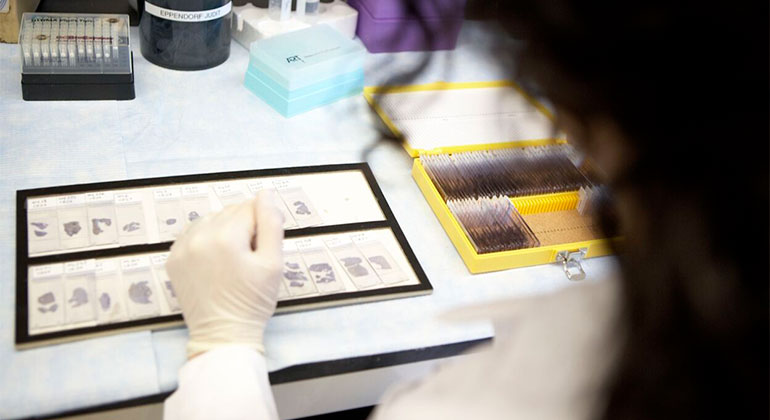Research and Clinical Programs

At Mount Sinai, our Division of Liver Diseases conducts vital new research that promises to improve care for those facing liver disease.
As faculty at the Icahn School of Medicine at Mount Sinai, our physicians are examining new antiviral drug combinations to treat and manage chronic hepatitis B and C and novel treatments for Fatty Liver Disease/ non-alcoholic steatohepatitis (NASH).
Helping Our Communities
As part of studies on viral hepatitis prevention, our Hepatitis Outreach Network provides screenings at no cost at health fairs and ethnic communities throughout New York City. Our Liver Education and Action Program (LEAP) team of patient navigators, care coordinators, and peers help patients with hepatitis C overcome barriers to care. As we treat effected populations in the communities we serve, we are making a difference and learning more about the virus. To guide our research, we use our vast experience in treating patients with all types of liver diseases.
As a multidisciplinary group, we strive to advance our knowledge in order to help patients in the following areas:
- Alcoholic liver disease
- Autoimmune diseases of the liver and bile ducts
- Complications of cirrhosis
- Early detection and treatment of liver cancer
- Fibrosis (scarring) and cirrhosis of the liver and treatments
- Hepatocellular carcinomas
- Liver disease associated with obesity and diabetes
- Liver transplantation
- Nonalcoholic fatty liver disease
- Hepatitis B, C and Delta diagnosis and treatment
This innovative research means, that as Mount Sinai patient, you have access to clinical trials of new therapies for liver disease. Some of these clinical trials include:
- Trials of new drugs for hepatitis B “cure”
- New drug trials for Delta hepatitis
- New drug trials for Fatty Liver Disease/Non-alcoholic steatohepatitis (NASH)
- New techniques in diagnosing fatty liver disease and primary biliary cirrhosis
- Studies on preventing liver scarring (fibrosis)
NASH Center of Excellence
Mount Sinai has recently launched a new NASH Center of Excellence. The goal of this center is to provide exemplary multi-disciplinary clinical care to all patients with NASH/NAFLD through standardization of clinical protocols and innovative clinical/translational studies. We invite patients to join us in our longitudinal registry and biobank which will not only provide them the opportunity to engage in clinical trials but to be carefully followed to prevent disease progression.
Clinical Trials
We believe that to provide the best possible clinical care, we must conduct clinical trials. Mount Sinai liver doctors are pioneering the use of many new drugs for liver diseases, including:·
- Delta hepatitis
- Hepatitis B
- NASH (Non-alcoholic steatohepatitis)
- Liver cancer
There are more than 40 new drugs for hepatitis B cure and NASH separately undergoing testing in the United States, and we are participating in clinical trials at Mount Sinai for many of them.
Learn more about hepatitis C treatments.
As a leader in clinical research, we provide you, as our patient, the option to enroll in cutting-edge research of new drugs before they are on the market. Mount Sinai offers you access to clinical trials of new oral medications without the side effects often associated with older drugs.
We are conducting clinical trials for preventing scarring of the liver (fibrosis) and treatments for fatty liver disease / NASH and primary biliary cirrhosis. These trials are ongoing and are in various stages of leading to new and better techniques for providing outstanding liver disease services.
Practical Results through Translational Research
The positive result of our research is that we are able to deliver cutting-edge treatments now as we continue to conduct clinical trials and research for the future.
At Mount Sinai, researchers in the lab work closely with our team of clinical researchers, allowing us to bring innovations to patients. Our teams of physician-scientists meet regularly to develop short-term and long-term research agendas. This way, Mount Sinai remains on the cutting-edge of medical science.
A number of leading organizations, including the National Institutes of Health, as well as innovative companies developing new therapies, support our research. We are making a difference by sharing our findings with physicians worldwide through publications in peer-reviewed medical journals.